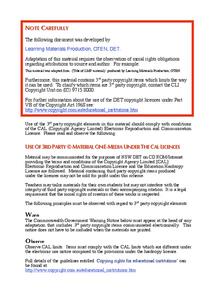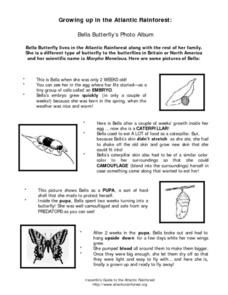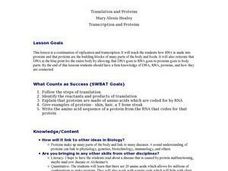Howard Hughes Medical Institute
Zebrafish and Skin Color
You may not know if that zebrafish in your fish tank is a model citizen—but it is definitely a model organism! What can we learn about ourselves from a tiny zebrafish? Discover more about the polygenic trait of skin color through a...
University of Colorado
Patterns and Fingerprints
Human fingerprint patterns are the result of layers of skin growing at different paces, thus causing the layers to pull on each other forming ridges. Here, groups of learners see how patterns and fingerprints assist scientists in a...
Nuffield Foundation
Going up in Smoke
Don't let all your hard work go up in smoke. Pupils conduct an experiment to see the harmful effects of cigarette smoke. They observe how smoke changes the color of white wool and an indicator solution.
Curated OER
Easy Tie Die
Perfect for summer camp, an after school program, or your classroom, these instructions will make tie-dying a breeze! Simple instructions and helpful images make tie dying a fun and easy project. Tip: Have learners predict the outcome of...
Aquarium of the Pacific
Fish for a Day
A short video shows how a scuba divers' equipment relates to major parts of a fish. Learners draw two fish and identify what aspects are the same and which are different. The scholars then draw a scuba diver, making sure they provide all...
Curated OER
Makeup-- A Wealth of Minerals
Students examine how a variety of minerals are used in make-up. They discuss the minerals that are found in things like make-up, soap, shampoo, and toothpaste and determine where the minerals come from.
Curated OER
Skin: Skin Prints
Learners explore human anatomy by participating in a print experiment. In this human skin instructional activity, students define the term "epidermis" and utilize computer paper, pencils, tape and baby wipes to create a print of their...
Curated OER
UV Rays, sunscreen effectiveness
Students identify and define that invisible UV rays can be harmful. Then they explore the effects of UV radiation on objects that react UV rays and what products are most effective in blocking UV rays. Students also make predictions...
Curated OER
Human Cheek Cell
Get up close and personal with human cells with this lab worksheet. Learners use a microscope to examine their own cheek cells, drawing diagrams of the cells and identifying the parts when they have focused in on a visible specimen....
PBS
Blow the Roof Off!
Blow the minds of young scientists with this collection of inquiry-based investigations. Based on a series of eight videos, these "hands-on, minds-on" science lessons engage young learners in exploring a wide range of topics...
Curated OER
Periodic Table of the Elements
First graders discuss, at their level, the concept of elements making up all matter. They discover the story of Dimitri Mendeleev and his discovery of the Periodic Table of the Elements. They locate and color some of the most common...
Curated OER
Transportation Choices and the Environment
Students study statistics and charts pertaining to how transportation and other energy choices impact the environment. They participate in small group discussions regarding concerns for the future.
American Museum of Natural History
Beyond T. Rex
Some dinosaurs get all the attention. Pupils use an interactive resource to study some of the lesser-known dinosaur species. Organizing the information in a cladogram allows learners to make connections among the species.
Howard Hughes Medical Institute
Spreadsheet Tutorial 4: t-Test
The t-test tutorial will fit your needs to a T. After calculating the mean, sum of squares, standard deviation, and variance of two data sets on a spreadsheet, scholars learn to calculate the t-values. They then learn to use the TTEST...
Curated OER
Tamar Burris
Students explore genetics. In this life cycle lesson, students consider the meaning of "genes" and "heredity" as they watch a video about the topics. Students then research their own genetic make-up as they interview family members....
Millennium Schools
Lifestyle Chemistry
My name is Bond, Hydrogen Bond. Written for distance scholars working on chemistry at the high school level, the lesson includes eight weeks worth of material divided into six parts: substances you use, mixing it up, your skin, what's...
Scholastic
Study Jams! The Immune System
A set of slides depicts sick children, an artistic rendition of a white blood cell amongst red blood cells, and a diagram of part of the lymph system to teach youngsters about immunity. Kids will find that it is made up of skin, white...
Curated OER
Life Cycle: Diversity in a Balance 4th Grade Workbook
In this life cycle workbook, 5th graders examine plant and animal cells, classification of organisms, human biology, photosynthesis, and natural environments. 21 different activities make up the Life Cycle Workbook.
Curated OER
Growing Up in the Atlantic Rainforest
In this science worksheet, students read and study pictures about the life cycle of a butterfly. Students then answer 10 questions about the passage. There is a word bank.
Education Outside
Natural Dye Tie-Dye
Up-cycle, or reprocess waste materials, into colorful tie-dye clothing or banners with an activity that uses fruits and vegetable juices as dye sources.
American Chemical Society
Forming a Precipitate
Can you mix two liquids to make a solid that is insoluble? Yes, you can, and pupils see this as the lesson uses more than one combination of liquids to form a solid. Through two teacher demonstrations and a hands-on activity,...
Curated OER
One of Our Five Senses - Touch
The wonderful world of Oobleck is entered in order to awaken your learner's sense of touch! As a warm up, learners put their hands in mystery bags in order to identify things that are wet, dry, hot, cold, hard, soft, rough, and smooth....
American Museum of Natural History
Gusty: The Gut Microbiome Card Game
Build up your gut. Groups up to four play a card game to learn more about the microbiome in the gut. Learners try to build a healthy gut with their cards. The player acquiring six microbes without any pathogens wins the game.
Curated OER
Translation and Proteins
Learners follow the steps of translation and identify the reactants and products of translation. They able to explain that proteins are made of amino acids which are coded for by RNA. Students are able to give examples of proteins--...























